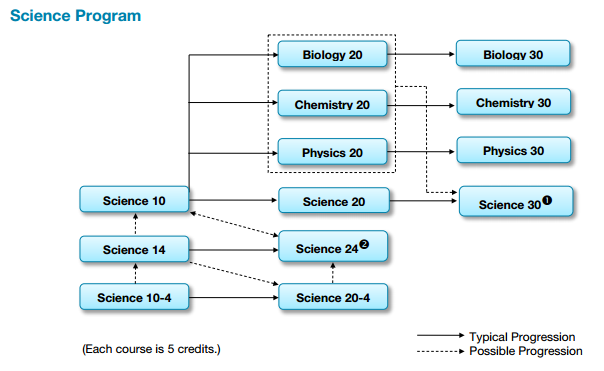
Science 10
This academic course provides students with a unified view of the biological, chemical, physical and earth sciences and an awareness of the connections among them. Science 10 is the prerequisite for all 20 level sciences.
The four topics covered are:
- Energy and Matter in Chemical Change
- Energy Flow in Technological Systems
- Cycling of Matter in Living Systems
- Energy Flow in Global Systems
Science 14
Students enrolled in Science 14 will actively investigate the properties of a variety of samples of matter, including mixtures and solutions, elements, and compounds encountered in everyday life.
Students will gain an understanding that the design of energy transfer technologies also takes into consideration the need for safety and for efficiency as a means of reducing reliance upon non-renewable energy resources.
Students will investigate life processes at the organism and system level, and extrapolate these processes to the cellular level.
Finally, students will gain an understanding that energy from the Sun sustains living systems and maintains equilibrium in the biosphere.
Science 20
This academic course provides students with a unified view of the biological, chemical, physical and earth sciences and an awareness of the connections among them.
The four topics covered are:
- Chemical Change
- Changes in Motion
- The Changing Earth
- Changes in Living Systems
Science 24
Students enrolled in Science 24 will investigate properties of matter.
They will investigate the classification of elements and the properties of mixtures and solutions encountered at home or in the workplace. Students will investigate a variety of important energy conversions occurring in biological, chemical, physical and technological systems. Students will learn about the body’s natural defense systems and about medical techniques developed to minimize the risk of exposure to environmental toxins and pathogens. Finally, students will gain an understanding that there is a greater risk of being injured or killed while travelling in a car or other motor vehicle than in other common activities.
Biology 20
This academic program explores interactions of living systems with one another and with their environment. In Biology 20, the underlying theme is energy and matter exchange.
The four topics covered are:
- Energy & Matter Exchange in the Biosphere
- Ecosystems & Population Change
- Photosynthesis & Cellular Respiration
- Human Systems
Chemistry 20
This academic program will give students an introduction to advanced chemistry. Students will learn how molecules interact with one another, investigate changes in matter, and begin to use practical lab skills to supplement their theoretical knowledge. A solid background in math is recommended for the analytical skills they will use in this course.
The four topics covered are:
- Chemical Bonding
- Gases as A Form of Matter
- Solutions, Acids & Bases
- Quantitative Relationships
Physics 20
This academic program introduces students to the study of force and energy changes that occur around us every day. Physics is a very mathematical course. It is recommended that students have an interest in math and a strong background in algebra.
The four topics covered are:
- Kinematics
- Dynamics
- Circular Motion, Work and Energy
- Oscillatory Motion and Mechanical Waves
Science 30
This academic course provides students with a unified view of the biological, chemical, physical and earth sciences and an awareness of the connections among them.
The four topics covered are:
- Living Systems Respond to Their Environment
- Chemistry in the Environment
- Electromagnetic Energy
- Energy and the Environment
The Science 20-30 program is designed for the student who is interested in science but does not require science courses for post-secondary education.
Biology 30
This academic program explores various human systems and principles of heredity. In Biology 30, the emphasis is on interactions between human systems.
The four topics covered are:
- The Nervous & Endocrine Systems
- Reproduction and Development
- Cell Division, Genetics, & Molecular Biology
- Population & Community Dynamics
Chemistry 30
This academic program is designed to study matter, energy and its changes. Students, through the study of Chemistry 30, are given an opportunity to explore and understand the natural world and to become aware of the profound influence of chemistry on their lives.
The four topics covered are:
- Organic Chemistry
- Thermochemical Changes
- Electrochemical Changes
- Equilibrium, Acids and Bases in Chemical Changes.
Physics 30
This academic program is designed to study matter and energy and their interactions. Physics 30 helps students understand the physics principles behind the natural events they experience and the technology they use in their daily lives.
The four topics covered are:
- Momentum & Impulse
- Forces and Fields
- Electromagnetic Radiation
- Atomic Physics
